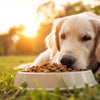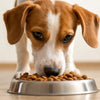Can Kittens Eat Dog Kibble? Understanding the Nutritional Needs of Our Feline Friends
- Houndsy
Table of Contents
- Introduction
- The Nutritional Needs of Cats vs. Dogs
- Can Kittens Eat Dog Kibble? The Short Answer
- What to Do If Your Kitten Eats Dog Food
- Keeping Your Kittens Away From Dog Food
- What to Feed Your Kitten Instead
- Conclusion
Introduction
As pet owners, we often find ourselves in amusing yet concerning situations. Picture this: you’ve just filled your dog’s bowl with fresh kibble, and before you know it, your curious kitten has snuck a few bites from the bowl. You might wonder, can kittens eat dog kibble without any repercussions? This common scenario raises critical questions about the nutritional needs of our pets.
In this blog post, we’ll explore the dietary requirements of cats versus dogs, dive into the implications of feeding kittens dog food, and offer practical advice on how to navigate mixed-pet households. By the end, you’ll understand not only why cats shouldn’t rely on dog kibble but also how to provide the best nutrition for your furry companions.
Let’s embark on this journey toward better pet care and nutrition, ensuring that our beloved pets thrive on diets suited to their specific needs.
The Nutritional Needs of Cats vs. Dogs
Cats: Obligate Carnivores
Cats, including kittens, are classified as obligate carnivores. This means that their bodies are biologically designed to thrive on a diet primarily composed of animal-based proteins. Unlike dogs, who are omnivores and can digest a variety of foods, cats require specific nutrients found predominantly in meat. Here are some key components of a cat's diet:
- High Protein Content: Cats require a higher protein intake than dogs. While dog food typically contains around 18-26% protein, cat food should ideally have 30-34% protein to meet their nutritional needs.
- Essential Amino Acids: Cats cannot synthesize certain amino acids, notably taurine, which is crucial for heart health, vision, and reproduction. Dog food generally lacks adequate levels of taurine.
- Fatty Acids: Cats need arachidonic acid, a fatty acid found only in animal fat, which is vital for skin health and overall well-being. Dogs can produce this fatty acid on their own, making it less critical in their diet.
- Vitamins: Cats require preformed vitamin A from animal sources, while dogs can convert beta-carotene from plant sources into vitamin A. This difference highlights the necessity of animal proteins in a cat's diet.
Dogs: The Omnivorous Diet
In contrast, dogs have evolved as omnivores, which means they can digest and thrive on a mix of animal and plant-based foods. Their nutritional profile includes:
- Protein and Carbohydrates: Dogs require a balanced diet that includes carbohydrates, proteins, and fats. This flexibility allows them to derive nutrients from a variety of sources.
- Essential Nutrients: While dogs do require some essential nutrients such as protein and certain fats, they can produce amino acids like taurine and can derive vitamin A from plant sources.
Summary of Key Differences
| Nutritional Component | Cats (Kittens) | Dogs |
|---|---|---|
| Protein | 30-34% minimum | 18-26% minimum |
| Taurine | Essential (must be ingested) | Can be synthesized |
| Arachidonic Acid | Essential (must be ingested) | Can be synthesized |
| Vitamin A | Needs from animal sources | Can convert from plant sources |
| Dietary Flexibility | Strict carnivores | Omnivores (flexible diet) |
Understanding these fundamental differences is essential when considering your kitten's diet. Now let’s explore whether it’s safe for kittens to consume dog food in the first place.
Can Kittens Eat Dog Kibble? The Short Answer
Yes, kittens can eat dog kibble without immediate toxic effects, but it’s not advisable. While an occasional nibble may not cause harm, the long-term consequences of a diet lacking in essential nutrients can be detrimental to their health. Let’s break down the reasons why.
The Risks of Feeding Kittens Dog Food
- Nutritional Deficiencies: Regularly feeding kittens dog kibble can lead to malnutrition. Without the necessary nutrients, kittens may experience stunted growth, weakened immune systems, and developmental issues.
- Digestive Issues: Kittens may have sensitive stomachs, and the different composition of dog food can cause digestive upset, leading to vomiting or diarrhea.
- Weight Gain: Kibble designed for dogs is often higher in carbohydrates and may not suit the energy needs of an active kitten, potentially leading to unhealthy weight gain.
- Long-Term Health Consequences: A lack of essential nutrients like taurine can result in severe health problems, including heart disease, vision issues, and even organ failure over time.
The Importance of a Species-Specific Diet
Feeding your kitten a diet formulated specifically for cats ensures they receive the proper balance of proteins, fats, vitamins, and minerals. Just as we wouldn’t feed our babies adult food, our kittens should have access to food designed to meet their unique growth and health needs.
What to Do If Your Kitten Eats Dog Food
If your kitten has snacked on dog kibble, there’s usually no cause for panic. However, monitoring for any signs of digestive upset is crucial. Here’s what you can do:
- Observe: Keep an eye on your kitten for 24 hours after they’ve eaten dog food. Look for any signs of vomiting, diarrhea, or lethargy.
- Hydrate: Ensure your kitten has access to fresh water at all times to help with digestion.
- Consult a Vet: If your kitten shows signs of distress or has consumed a significant amount of dog food over time, consult your veterinarian for advice.
- Educate Yourself: Understanding the nutritional requirements of your pets can help prevent future mishaps. Read labels carefully and ensure you’re providing the appropriate food for each pet.
Keeping Your Kittens Away From Dog Food
If you have both dogs and cats in your home, it’s important to implement strategies to prevent your kittens from sneaking dog food. Here are some effective methods:
Feeding Stations
- Separate Feeding Areas: Designate different areas for your pets to eat. Elevate dog bowls to a height that kittens can’t reach, or place them in a location inaccessible to your cats.
- Scheduled Feeding: Instead of free-feeding both pets, establish a feeding schedule. Serve meals at specific times and remove leftover food promptly.
- Automatic Feeders: Consider using automatic feeders that can be programmed to dispense food at certain times for your dog, ensuring that it’s only accessible to them.
Behavioral Training
- Positive Reinforcement: Train your cat to understand mealtime boundaries. Reward them for sticking to their own feeding area and discourage them gently from approaching the dog’s bowl.
- Distraction During Meals: Provide toys or treats to keep your kitten occupied while your dog eats. This can help reduce the urge to sneak bites.
What to Feed Your Kitten Instead
If you find yourself in a situation where you’ve run out of cat food, here are some safe alternatives you can provide to ensure your kitten stays nourished until you can replenish their food supply:
- Cooked Meats: Plain cooked chicken, turkey, or beef can serve as an excellent protein source.
- Canned Tuna: This can be a tasty treat, but it shouldn’t replace regular meals.
- Eggs: Scrambled or boiled eggs can provide protein and are generally safe.
- Commercial Cat Food: If you have any cat food available, even if it’s not their regular brand, it’s the best option.
Avoid These Foods
While there are safe alternatives, there are also foods you must avoid feeding your kitten. Some common human foods that are toxic or harmful to cats include:
- Onions and garlic
- Chocolate
- Grapes and raisins
- Caffeine
- Alcohol
Understanding what is safe and what isn’t is crucial for your kitten’s health and safety.
Conclusion
In conclusion, while it’s technically safe for kittens to eat a few pieces of dog kibble, it’s not a suitable or healthy long-term diet. Our feline friends require a specialized diet rich in animal proteins, essential amino acids, and nutrients that dog food simply cannot provide.
As responsible pet owners, it’s our duty to ensure that our pets receive the best nutrition possible. By understanding the differences in dietary needs and taking proactive steps to prevent cross-feeding, we can keep our cats healthy and thriving.
If you find yourself struggling with pet feeding routines, consider investing in innovative feeding solutions like the Houndsy Kibble Dispenser. This product is designed to simplify and elevate your pet feeding experience, ensuring that your pets receive their meals in a convenient and consistent manner. Order Now to enhance your pet feeding routine today!
FAQ
Can kittens eat dog food occasionally?
Yes, kittens can eat dog food occasionally without immediate harm. However, it is not advisable as a regular part of their diet.
What are the risks of feeding kittens dog food?
Feeding kittens dog food can lead to nutritional deficiencies, digestive issues, and long-term health consequences.
What should I do if my kitten eats dog food?
Monitor your kitten for any signs of distress, provide fresh water, and consult your veterinarian if necessary.
How can I prevent my kitten from eating dog food?
Separate feeding areas, scheduled meals, and automatic feeders can help keep your kitten away from dog food.
What can I feed my kitten if I run out of cat food?
Safe alternatives include cooked meats, canned tuna, and scrambled eggs. Avoid harmful foods like onions, chocolate, and grapes.
By prioritizing the nutritional needs of our pets, we can ensure they live happy, healthy lives. Thank you for being a responsible pet parent!












